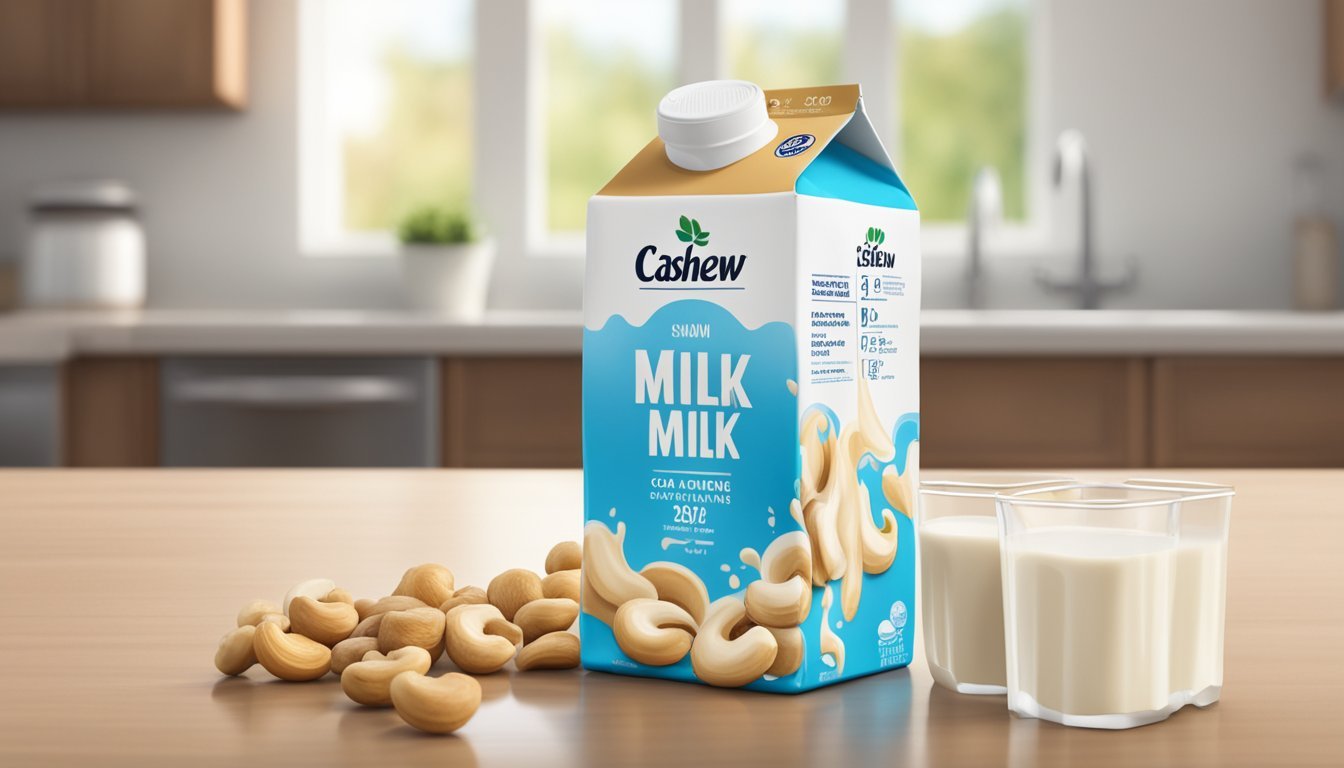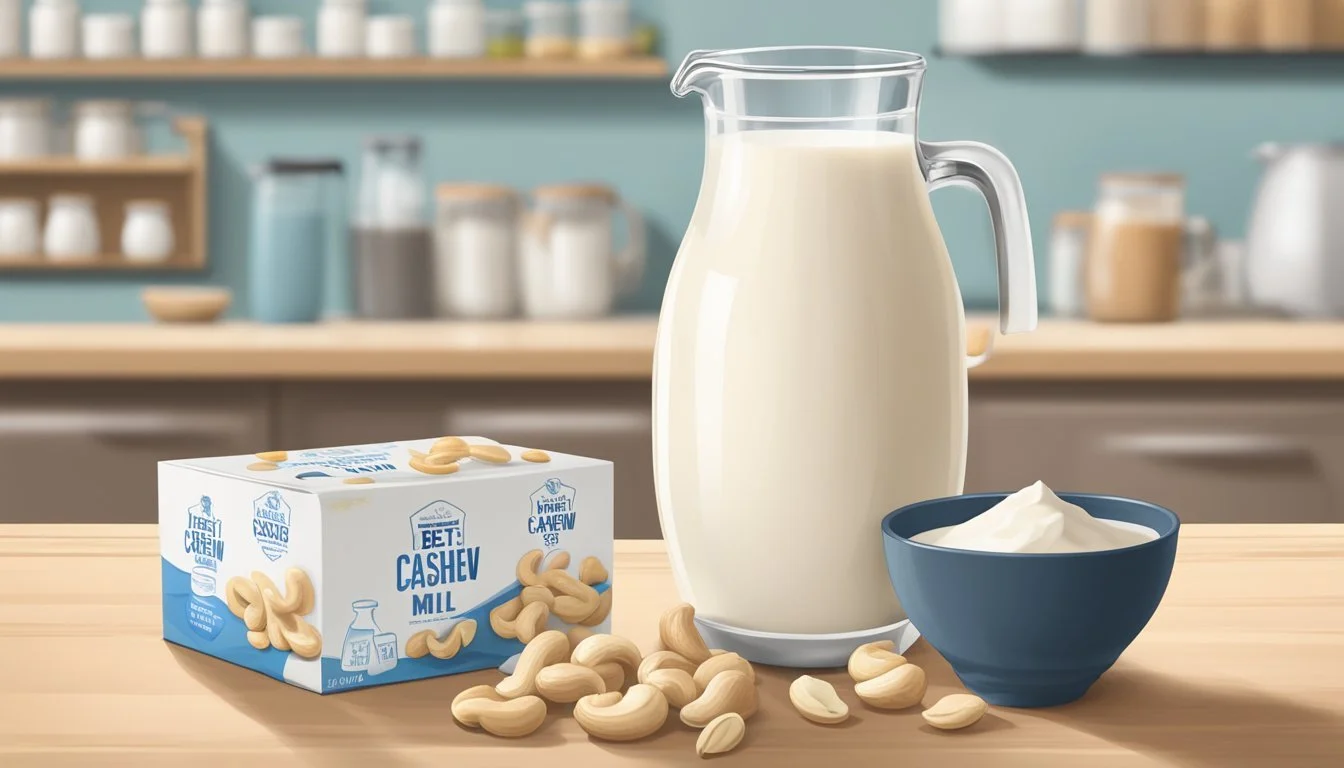Does Cashew Milk Spoil?
Everything You Need to Know
Cashew milk, a popular plant-based milk alternative, offers a creamy and nutty flavor that appeals to many seeking a vegan or dairy-free option. Yes, cashew milk can spoil, and it's important to recognize the signs of spoilage to ensure safety and quality. When properly stored, typically in a tightly sealed container in the refrigerator, cashew milk can last between 7-10 days. However, homemade versions, which often lack preservatives, tend to have a shorter shelf life, usually around 3-5 days.
Consumers should stay vigilant for indicators such as a sour smell, unusual texture, or off-putting taste. These signs suggest that the cashew milk has gone bad and should be discarded to avoid potential health issues. Whether opting for store-bought or homemade cashew milk, understanding its shelf life and proper storage methods is crucial for maintaining its freshness and enjoying its full flavor.
Understanding Cashew Milk
Cashew milk is a popular dairy alternative known for its creamy texture and nutty flavor. It is especially favored by those who are vegan or lactose intolerant.
Composition and Health Benefits
Cashew milk is primarily made by blending cashews with water, resulting in a creamy and thick consistency. It often contains fewer calories than other nut-based milks, making it a choice for those watching their caloric intake.
Nutritional Profile:
Vitamins: Rich in vitamins E and K
Minerals: Contains magnesium, iron, and potassium
Fat Content: Lower in fat compared to coconut milk
Health benefits include promoting heart health due to its healthy fat content and providing antioxidants that support the immune system. It is also low in sugar, especially in unsweetened varieties, making it suitable for diabetic individuals.
Comparison With Other Milk Alternatives
When compared to other plant-based milk alternatives like almond milk, oat milk, coconut milk, and soy milk, cashew milk stands out for its creamy texture. Almond milk has a similar nutty flavor but is less creamy, making cashew milk a preferred option for recipes requiring a thicker consistency.
Key Differences:
Oat Milk: Higher in carbohydrates, often thicker
Coconut Milk: Higher fat content and stronger flavor
Soy Milk: Higher in protein and often fortified with additional nutrients
Cashew milk is an excellent option for those who desire a balance between taste and nutritional benefits. It works well in both sweet and savory recipes, and its neutral yet nutty flavor integrates seamlessly into various dishes. The simplicity in ingredients also makes it an allergen-friendly alternative for many.
Shelf Life and Spoilage
Cashew milk can spoil, and its shelf life varies based on several influential factors. Understanding how to identify spoiled milk is essential to ensure consumption of fresh and safe cashew milk.
Factors Influencing Shelf Life
The shelf life of cashew milk depends on whether it is store-bought or homemade. Store-bought cashew milk typically contains preservatives that extend its shelf life to about 7-10 days once opened. Homemade cashew milk, often preservative-free, usually lasts for 3-5 days.
Storage conditions play a crucial role. Cashew milk should be refrigerated and stored in a tightly sealed container. Exposure to light and fluctuating temperatures can shorten its shelf life.
Spoilage Mechanisms
Cashew milk spoilage is mainly due to microbial growth. Bacteria and mold thrive in the nutrient-rich environment of cashew milk, leading to spoilage.
Opened cashew milk is more susceptible to contaminants, as exposure to air introduces bacteria. The natural sugars and fats in cashew milk provide an ideal medium for microbial proliferation. Expiration dates on packaging serve as guidelines, but physical signs of spoilage need close monitoring.
Signs of Spoilage
Identifying spoiled cashew milk involves checking for changes in smell, texture, and taste. A sour or off smell is one of the clearest indicators. Texture changes, such as curdling or lumpiness, suggest spoilage.
Taste is another critical criterion; an off or sour taste means the milk has spoiled. Additionally, any change in color or the presence of mold indicates that the milk should not be consumed. Regular inspection and adherence to storage recommendations ensure the best quality and safety.
Safe Consumption
Ensuring the quality and safety of cashew milk involves understanding signs of spoilage and recognizing potential health risks.
Determining Freshness
Cashew milk, like other dairy alternatives, can spoil. Freshness is determined by several key indicators:
Expiration Date: Check the expiration or "best by" date on the package. While not a definitive guide, it helps estimate freshness.
Smell: A sour or off smell is a clear sign of spoilage.
Texture and Appearance: Spoiled cashew milk may have a lumpy or slimy texture. Separation is normal, but if shaking does not recombine it, the milk might be bad.
Taste: A taste test can verify its quality. If it tastes sour or off, it is likely spoiled.
Health Risks of Spoiled Milk
Consuming spoiled cashew milk poses several health risks. Exposure to harmful bacteria and molds, which can grow if the milk is not stored correctly, can lead to food poisoning. Symptoms might include nausea, vomiting, stomach cramps, and diarrhea.
To avoid these risks, ensure cashew milk is stored in a refrigerator and consumed within the recommended 7-10 days after opening. Contamination during handling can speed up spoilage and increase health hazards. Monitoring the storage conditions and regularly checking for signs of spoilage helps maintain safety and prevent illness.
Storage Practices
Proper storage of cashew milk is crucial to maintain its freshness and prevent spoilage. This includes controlling temperature, protecting it from light, and choosing the appropriate storage containers.
Proper Storage Conditions
Cashew milk should be stored in a refrigerator immediately after opening. The ideal temperature range for storing cashew milk is between 32-39°F (0-4°C). Keeping it in the coldest part of the refrigerator, typically near the back, helps maintain its quality.
Avoid exposure to light. Direct sunlight can degrade the nutritional quality of the milk. An airtight container is recommended to prevent contamination and reduce the absorption of odors from other foods. Always ensure the lid is tightly sealed after each use.
Effects of Refrigeration
Refrigeration is essential for preserving the texture and taste of cashew milk. Stored properly, cashew milk can last 7-10 days in the refrigerator. When refrigerated, it may naturally separate into layers, particularly if it’s homemade or lacks stabilizers.
Shaking the container vigorously before each use helps re-blend the milk. Be mindful of spoilage signs such as a sour smell, unusual texture, or off-putting taste. Discard the milk if any of these signs are present to avoid health risks such as stomach discomfort.
Freezing Cashew Milk
Freezing cashew milk is a viable option for extending its shelf life. Pour the milk into an airtight container, leaving some space at the top as the liquid expands when frozen. Label the container with the date to keep track of storage time.
To thaw, place the frozen milk in the refrigerator for several hours or overnight. It may separate during the freezing process, so blend or shake it well before use. While freezing can affect the texture slightly, it remains safe to consume and useful for cooking and baking.
By adhering to these storage practices, cashew milk can be kept fresh, flavorful, and safe for consumption.
Maximizing Freshness
To keep cashew milk fresh, proper storage and handling are crucial. Both homemade and store-bought cashew milk have specific needs to extend their shelf life and maintain quality.
Tips for Prolonging Freshness
Storing cashew milk in an airtight container is essential to prevent contamination and maintain freshness. This includes making sure that the container is properly sealed to avoid absorption of unwanted odors from the refrigerator.
Refrigeration is key. Homemade cashew milk should be kept in the fridge and is best consumed within 3 to 4 days. For commercial versions, follow the expiration date and storage instructions on the package.
Freezing cashew milk can also extend its life. Pour the milk into freezer-safe containers, leaving some space for expansion. Thaw it overnight in the refrigerator and shake well before use as separation may occur.
Handling Unopened vs. Opened Cashew Milk
Unopened cashew milk, especially store-bought varieties, usually has a longer shelf life due to preservatives and pasteurization. Shelf-stable versions can be kept in a cool, dark place until the expiration date. Refrigeration is not necessary until the package is opened.
Opened cashew milk, whether homemade or store-bought, should always be refrigerated. It should be placed at the back of the fridge where temperatures are most consistent. Use within 7 to 10 days to ensure optimal taste and safety.
Always check for signs of spoilage like sour smell, curdling, or off taste. When in doubt, it is safer to discard the milk to avoid any health risks.
Cashew Milk in Cooking and Baking
Cashew milk is a versatile dairy alternative used in various cooking and baking recipes. Its creamy texture and mildly nutty flavor make it suitable for both savory and sweet dishes.
Culinary Uses
Cashew milk's smooth consistency blends well in cooking, making it an excellent choice for soups, sauces, and creamy pasta dishes. It's often favored for its ability to enhance textures without overpowering flavors.
For savory dishes:
Soups: Adds richness to pureed vegetable soups.
Sauces: Works in creamy sauces for pasta or casseroles.
Curries: Complements spice blends in Indian and Southeast Asian curries.
In sweet applications, cashew milk can replace dairy in:
Smoothies: Blends smoothly with fruits and sweeteners.
Desserts: Perfect in puddings and ice creams.
Breakfast dishes: Use in oatmeal or overnight oats.
Considerations for Baking Recipes
When substituting cashew milk in baking, certain adjustments improve outcomes. Cashew milk lacks the proteins found in cow's milk, affecting texture and rise in baked goods.
Leavening agents: Consider slightly increasing baking powder or baking soda to help compensate for the missing proteins.
Consistency: Cashew milk's thinner consistency may require reducing other liquids in the recipe or adding a thickening agent like cornstarch.
Flavors: Its mild nutty flavor blends well but avoid using in recipes where a neutral flavor is crucial.
Sweeteners: Commercial cashew milk often comes sweetened; check labels to avoid altering the intended sweetness of your recipe.
In summary, cashew milk is a practical dairy alternative in cooking and baking when adjustments are made to accommodate its unique properties.
Identifying and Managing Separation
Cashew milk, like many plant-based milks, can experience separation. Recognizing and addressing this can help maintain its texture and taste.
Preventing Separation
Refrigeration is key in preventing separation. Cashew milk should always be stored in the refrigerator at a consistent temperature. Temperature fluctuations accelerate separation. Shake the bottle before each use to mix any settled particles back into the liquid.
Correcting Separation
If separation occurs, a quick shake usually resolves it. Use a blender for more severe cases. Pour the separated milk into the blender and blend for about 30 seconds. This re-emulsifies the ingredients, restoring the milk’s creamy texture.





